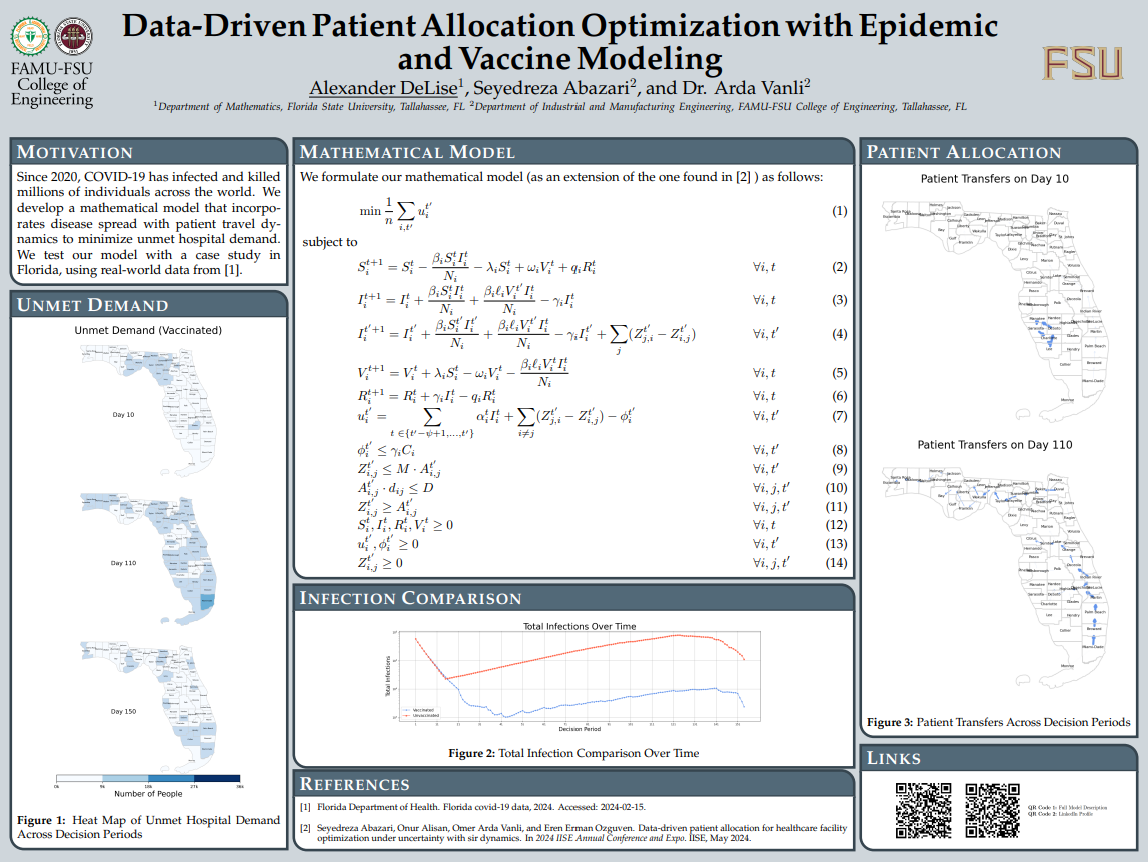Research Symposium
25th annual Undergraduate Research Symposium, April 1, 2025
Alexander DeLise Poster Session 2: 10:45 am - 11:45 am/ Poster #35

BIO
Alex DeLise is an undergraduate student at Florida State University majoring in Applied Mathematics and Computational Science. With a strong interest in industrial engineering and operations research, Alex is drawn to mathematical modeling and optimization techniques for improving decision-making in complex systems. They plan to pursue a Ph.D. in Operations Research, focusing on data-driven approaches to resource allocation, logistics, finance, and other large-scale optimization challenges. Alex aims to develop innovative methods that bridge theoretical research and practical applications, contributing to advancements in efficiency and problem-solving across various industries.
Data-Driven Patient Allocation Optimization with Epidemic and Vaccine Modeling
Authors: Alexander DeLise, Seyedreza AbazariStudent Major: Applied and Computational Mathematics, Computational Science
Mentor: Seyedreza Abazari
Mentor's Department: Department of Industrial and Manufacturing Engineering Mentor's College: FAMU-FSU College of Engineering Co-Presenters:
Abstract
Pandemics strain healthcare systems worldwide, creating urgent challenges in allocating limited resources like hospital beds while controlling disease spread. Effective patient allocation during such crises is critical to minimizing unmet healthcare demand and ensuring equitable healthcare access across regions. This study addresses these issues by developing a mixed-integer nonlinear mathematical model that integrates Susceptible-Infected-Recovered-Vaccinated (SIRV) epidemic dynamics with patient transfer and allocation to improve patient distribution during outbreaks. Our approach also factors additional disease transmissions caused by the assignment of patients to different regions. Our model minimizes unmet demand per county for hospital beds and incorporates real-world data in the model parameters. We observe that in large metropolitan areas, where access to healthcare is critical, the vaccinated scenario exhibits significantly lower unmet hospital demand compared to the unvaccinated scenario, an outcome directly tied to the vaccines' success in lowering peak infection rates as demonstrated by the SIRV dynamics. The reduction in infection surges not only alleviates hospital capacity strain but also leads to fewer total patient transfers, underscoring the effectiveness of vaccination during pandemics. This research demonstrates the potential to enhance pandemic response strategies. The model provides policymakers and healthcare administrators with a robust, data-driven tool to make informed decisions, reducing strain on overburdened facilities and improving patient outcomes during pandemic scenarios.
Keywords: COVID-19, Healthcare Facilities, Location Allocation, Optimization, Florida, Epidemiology

